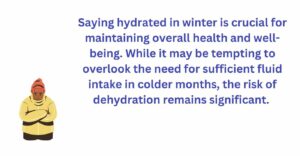For a huge number of people, summer is the peak water season. We don’t say no, summer is a crucial time to stay hydrated, and drinking water regularly during summer is an effective way to help a person beat the heat. What most people don’t realize is that, just like summer, winter hydration is also equally important.
We understand that you would not feel as thirsty as you do in summer compared to winter, but just because the thirst factor is absent, doesn’t mean your body doesn’t require water or any other fluids. Hydration during winter is a fact that is overlooked by a lot of people, the importance of hydration in winter is only understood by some. Hence, read on to learn more about winter hydration.
Causes of Dehydration in winter
In winter, dehydration can occur due to various factors. The cold weather often makes people less aware of their fluid intake, leading to insufficient hydration. During colder months, individuals may not feel as thirsty as they do in hot weather, causing them to overlook the importance of drinking an adequate amount of water.
1. Central heating systems
Additionally, central heating systems in homes and offices can contribute to dehydration. These systems tend to dry the air, increasing the rate of water loss from the body through breathing and skin. People may not notice this moisture loss, and as a result, they may not compensate by drinking enough water.
2. Winter activities
Winter activities, such as skiing or snowboarding, can also contribute to dehydration. Engaging in physical exertion in the cold weather may cause individuals to sweat, and they may not realize the extent of fluid loss due to the cooler temperatures.
3. Consuming hot beverages
Moreover, consumption of hot beverages like tea, coffee, and cocoa, which are popular choices during winter, may have an adverse effect, leading to increased urine production and potential dehydration.
To prevent dehydration in winter, it is essential to be mindful of fluid intake, even when not feeling particularly thirsty. Incorporating water-rich foods and maintaining a balanced beverage consumption can help ensure proper hydration during the colder months.
Signs of dehydration in winter
Identifying dehydration during winter is crucial for maintaining overall health. Here are signs to watch for:
1. Dry Skin and Lips
Skin may feel dry, flaky, or tight, and lips may become chapped.
2. Dark Urine
Dark yellow urine is a sign of concentrated waste, indicating insufficient water intake.
3. Fatigue
Dehydration can lead to tiredness and a lack of energy, making daily tasks more challenging.
4. Dizziness
Feeling lightheaded or dizzy can result from a decrease in fluid levels.
5. Thirst
While feeling thirsty is an obvious sign, in winter, people may not recognize it as readily as in warmer months.
6. Headaches
Dehydration can cause headaches due to reduced fluid surrounding the brain.
7. Reduced Urination
Infrequent urination or smaller amounts may indicate dehydration.
8. Dry Mouth and Throat
A parched mouth and a scratchy throat are common signs of inadequate hydration.
9. Muscle Cramps
Dehydration can lead to electrolyte imbalances, resulting in muscle cramps.
10. Difficulty Concentrating
Insufficient fluid intake may impact cognitive functions, making it hard to focus.
Importance of hydration during winter

1. Physical well-being
Staying hydrated in winter is crucial for maintaining overall health and well-being. While it may be tempting to overlook the need for sufficient fluid intake in colder months, the risk of dehydration remains significant. Cold weather and indoor heating systems can contribute to moisture loss from the body through breathing and skin, making it essential to replenish lost fluids.
2. Regulate Body Temperature
Proper hydration plays a key role in supporting various bodily functions. It helps regulate body temperature, ensuring that vital organs function optimally despite the chilly weather. Additionally, staying well-hydrated aids in digestion and nutrient absorption, promoting overall digestive health.
3. Reduce Fatigue
During winter, people often engage in outdoor activities such as skiing or snowboarding, which can lead to increased fluid loss through sweat. Adequate hydration helps replenish these lost fluids, contributing to better physical performance and reducing the risk of fatigue.
4. Boost Immunity
Maintaining hydration supports the immune system, which is particularly important during the winter when the risk of colds and flu is higher. Hydration also benefits the skin, preventing it from becoming dry and irritated due to the cold, dry air.
In essence, prioritizing hydration in winter is integral to sustaining bodily functions, promoting energy levels, and fortifying the body against the challenges posed by the colder season.
Tips to stay hydrated during winter
Staying hydrated in winter is essential for overall health. Here are five simple tips to ensure you maintain adequate fluid intake during the colder months:
1. Regular Water Intake
Make a conscious effort to drink water regularly throughout the day. Set reminders or carry a reusable water bottle to help track and increase your water consumption.
2. Hydrating Foods
Include water-rich foods in your diet, such as fruits and vegetables like watermelon, cucumber, oranges, and celery. These foods contribute to your overall fluid intake.
3. Warm Beverages
Enjoying warm beverages like herbal teas, broths, and soups not only provides comfort in the cold but also adds to your daily fluid intake. Opt for options without added sugars or caffeine.
4. Moisturize Skin
Keep your skin hydrated by using moisturizers. A well-moisturized skin is less likely to lose water, helping to prevent dehydration caused by the dry winter air.
5. Monitor Indoor Heating
Be mindful of indoor heating systems, which can contribute to a dry environment. Consider using a humidifier to add moisture to the air, helping to prevent excessive water loss from your body.
By incorporating these simple practices into your winter routine, you can effectively combat dehydration and ensure that your body remains properly hydrated, supporting overall health and well-being.
Get 7 Days Risk Free Trial
Conclusion

In conclusion, maintaining hydration in winter is vital for overall health. By adopting simple habits like regular water intake, consuming hydrating foods, enjoying warm beverages, moisturizing the skin, and monitoring indoor heating, individuals can ensure their bodies stay well-hydrated, supporting optimal functioning and well-being during the colder months.




